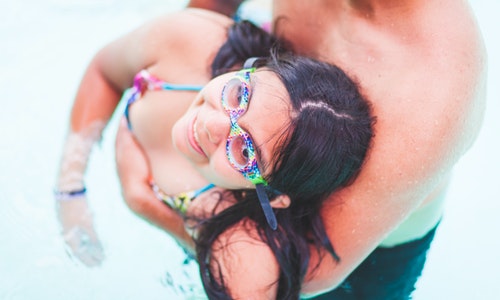Pain after the pool: How to spot, prevent and treat swimmer’s ear this summer
Nothing ruins a day at the pool quite like getting water in your ear. Left untreated, this can cause swimmer’s ear: a painful infection that requires a trip to the doctor. But what exactly is swimmer’s ear and how can we prevent it this summer? We talked to Dr. Vicky Leff, a pediatrician at Atrium Health Levine Children’s Cotswold Pediatrics, to find out more.

Swimmer’s ear 101
Dr. Leff says swimmer’s ear, also known as otitis externa, is an inflammation of the external ear canal. Not to be confused with a middle ear infection, which occurs behind the eardrum and is normally preceded by a cold or other virus, swimmer’s ear affects the part of the ear between the eardrum and the outside of the head.
Swimmer’s ear typically happens when water remains in the ear after swimming, creating the perfect warm, moist environment for yucky bacteria to grow. It’s much more common in the summer, when people are swimming more frequently.
People can get swimmer’s ear from the pool, but it’s unlikely to come from bathing or showering, Dr. Leff says.
Kids ages 5 to 9 are the most likely to be affected, which makes sense because they’re just learning to jump, dive and swim underwater for longer periods of time. Don’t worry, Dr. Leff says chances of getting swimmer’s ear decrease with age.

When to see a doctor
Typical symptoms of swimmer’s ear include pain, itching, discharge and hearing loss, Dr. Leff says.
You’ll need to take your child to the doctor if he or she complains of pain in the ear, you see discharge coming from the ear, your child gets a fever or symptoms get worse.
At the pediatrician, Dr. Leff says your child will likely be treated with antibiotic ear drops. If that happens, check with your doctor to find out when your child can swim again.

Prevent the problem
Keep swimmer’s ear at bay by drying your child’s ear thoroughly after swimming, no matter if it’s in a pool, a lake or the ocean.
But don’t put objects such as cotton swabs (or fingers) deep into the ear canal — a scratch or irritation to the ear canal can cause swimmer’s ear even if your child hasn’t been in the pool lately.
Some doctors recommend over the counter drops to prevent swimmer’s ear, with alcohol typically as the main ingredient. Check with your pediatrician to see what’s right for your family.

Vicky Leff, DO has been practicing for 22 years and is most interested in newborn, allergy and asthma care. She has a 21-year-old son and enjoys exercising, cooking, baking and traveling in her spare time. To make an appointment with Dr. Leff or another provider at Atrium Health Levine Children’s Cotswold Pediatrics call (704) 512-4475
Connect with Atrium Health Levine Children's


